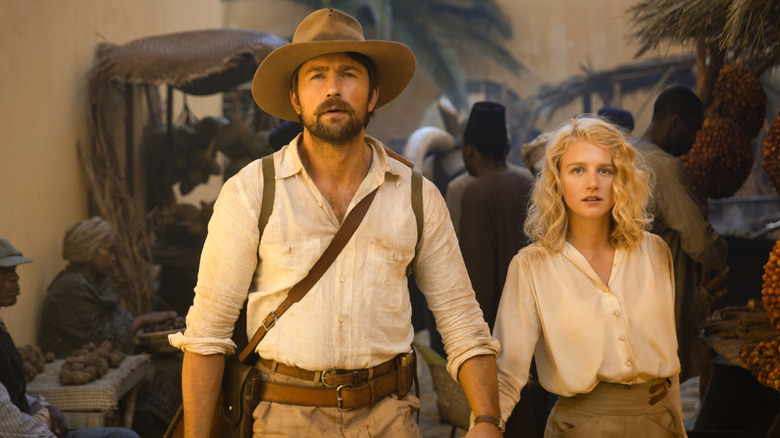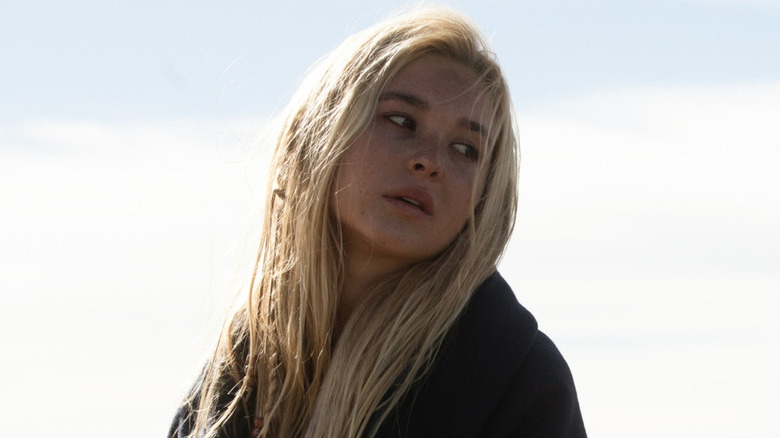The One Big Difference Between The Yellowstone Spin-Offs 1883 And 1923
Taylor Sheridan's "Yellowstone" franchise is unified in its themes of survival, family, capitalism, and the environment, but each show boasts its own distinct qualities to separate it from the pack. Each series takes place during a different time period, all of which pose unique threats, problems, and obstacles for the Dutton family. That said, "1883" and "1923" feel more closely connected as they feature some of the same characters and similar storylines (which we will get to later), but Taylor Sheridan believes that there is one key difference between both the "Yellowstone" prequel series.
According to Sheridan, "1883" and "1923" both deal with the topic of expansion, albeit in different ways. "1883" centers around pioneers traveling across the American West to make their fortunes, but it ends in disaster for most of them. Meanwhile, "1923" depicts an Africa where Spencer Dutton (Brandon Sklenar) makes a living as a hunter while rich English people go on safaris and drink champagne, which is less stressful. Sheridan believes that "1883" is more fatalistic in its approach to the topic, while "1923" is more rooted in romanticism. As he told Deadline:
"I started reading about these people living in Africa, attempting but failing to duplicate the American expansion in a place that was where we all came from... Nairobi was this incredible colonial, and I say incredible only that they had built this playground for the elite in the middle of where we evolved, and the danger of the place was the allure. It was wickedly dangerous, and there's a romanticism, as opposed to the fatalism of '1883.'"
Sheridan added that the 1920s is regarded as a romantic era, which comes through in "1923." However, don't go into it expecting a series that's devoid of horrific moments, as Sheridan doesn't make life easy for its characters.
There are also similarities between 1883 and 1923
The expansion-themed adventure at the heart of "1883" is brutal, as it ends with most of the wagon train dying as they deal with bandits, tornadoes, rattlesnakes, intense confrontations Native Americans, and the harsh terrains of the wild frontier during their travels. In "1923," however, the African expansion has led to outsiders already living a better life; the British elites enjoy luxury, and Spencer Dutton works alongside some of the locals to hunt wild animals. The jungle is still portrayed as dangerous, sure, but there is respite from the wild terrains, whereas "1883" is full of unrelenting danger.
That said, both shows are similar in the sense that they contain doomed love stories, so the "romantic" element of "1923" ends with its portrayal of foreign settlers and African people getting along. "1883" sees Elsa Dutton (Isabel May) die after losing two boyfriends during her cross-country travels toward Montana. Meanwhile, on "1923," Spencer and Alexander Dutton's (Julia Schlaepfer) love story ends in tragedy following a perilous journey that required them to sail across oceans to be together again. Jack Dutton (Darren Mann) and Elizabeth Strafford (Michelle Randolph) don't get to live happily ever after either, as they lose a baby before he gets shot down in cold blood.
Both series are brilliant in their own way, but they are equally brutal and devastating to watch — especially regarding their treatment of young lovebirds. The "Yellowstone" franchise isn't afraid to go to some dark places, and "1883" and "1923" feature some of its bleakest moments to date.

